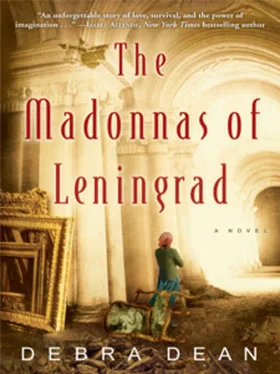The Rubens Room. Even here, in a room riotous with flesh, the painting at the center of the long wall gives one pause. Here is a young woman suckling an old man. She is young and plump and fresh-faced. He is naked, with only a black cloth draped over his genitals. His hands are bound in chains behind his back. Although his musculature is beautiful-the arms and legs fully sculpted, the chest and abdomen defined-his head is a horror: the beard and hair matted, the eyes bulging as grotesquely as a gargoyle’s and focused downward on the girl’s exposed nipple.
Before you either turn away in disgust or wink knowingly at one another, you should know that the artist insists that this is a picture about love. Filial love. The old man has been condemned by the Roman senate to die of hunger, and his daughter has come to his prison cell and offered her breast to feed him. This has nothing to do with the decorous love or amorous passions one is more accustomed to seeing in a painting. It is raw and wretched and demeaning. In the end, we are physical bodies and every abstract notion about love sinks beneath this fact.
“Doesn’t she look beautiful, Mama? The something old is Naureen’s pearls.”
“She reminds me of a girl I knew once.”
“Who was that?”
“Back in Leningrad. I don’t know-I forget her name now. She was upstairs.”
“Was this when you lived in the cellar?”
“Yes. I would go upstairs and visit her.”
“I don’t understand something. Why were you living in a cellar?”
“It was the war. They were dropping bombs.”
“Oh. Of course. That makes sense.”
“We all lived in the cellars then.”
“But not your friend who lived upstairs?”
“No.”
“Why not her?”
“I don’t know. I can’t remember.”
“It’s okay, you don’t have to. I was just curious.”
“Her father died of starvation that winter. I remember that. She fed him with her breast milk, but he died anyway.”
Sleds have appeared on Nevsky Prospekt, throughout the city, children’s sleds painted red and yellow and blue. The tramcars have long since stopped running, frozen wherever they happened to be on their runs when the last of the electricity shut down. To get from one place to another, people walk. The streets are nearly deserted, but a few people trudge in slow motion, their bodies bent forward as if into a stiff wind. Some pull sleds, ferrying those who can no longer walk. The lame. The dead. Corpses wrapped in swaddling or still bundled in their heavy coats. Blue feet protrude. The only sounds on the street are the terrible squeaking of runners on ice.
Marina struggles over a hummock of frozen snow on the sidewalk. She has been walking for more than two hours and has journeyed five blocks from the service entrance of the New Hermitage, a distance she once traveled in an abstracted heartbeat, giving it no more of her attention than she gave to breathing. Now it is like being in a dream and trying to run from something: her legs will not move, they are inanimate wood, rooted into the ground, and only with a concentrated effort of will can she heave one stump off the ground, push it forward, then set it down again gingerly, feeling for the slide of ice beneath her boot before she shifts her weight.
She rests, breathless and dizzy from the exertion, and reaches out her hand to rest it against the stone front of a building for support. Slowly, she lifts her eyes up from the ground. The flat gray sky reels momentarily before stabilizing.
She is only a few blocks from the Krasnov apartment, but though this is her neighborhood, she hardly recognizes it. Hoarfrost covers every surface, and icicles hang like moss from the wires and eaves above her. The buildings, too, are crusted over with ice, and their boarded windows present a blank face to the street. There is no noise, no dogs or cats in the street, no smoke drifting up from the chimneys, no evidence at all of life. She might be the sole remaining survivor of a lost civilization, like Uncle Viktor’s Urartu. The doomed citizenry has left behind messages, however, plastered on the plywood and walls and sealed under ice, but still legible. Here is a poster with the uplifting pronouncement “Victory Is Near.” Another official poster commands the reader to seek shelter during air raids and threatens severe penalties for failing to do so. Beneath these, at eye level, is a frozen collage of typed and handwritten notices: offers to exchange shoes, a mahogany armoire, a bicycle, gold and silver jewelry, a morocco-bound set of travel journals, a sable coat, a typewriter. Whatever one might want is advertised here, all in exchange for foodstuffs. They are old, the ragged scraps of paper smeared and buried under layers of frost. The last desperate pleas of the civilization, they were posted here back when one might still conceivably barter for food. There are no fresh notices.
In this new geography, the next corner recedes into the distant horizon like the forced perspective in landscapes, hazy gray and impossibly far away, separated by a rolling mountain range of compacted dirty snow and studded with frozen hills of trash and slick lakes of ice. She resolutely turns her attention back to her legs, to the next step. In front of her, she holds out the image of a chocolate bar.
Today is Tatiana’s birthday, and Nadezhda was particularly distressed this morning on account of the day. She cannot admit the too-crushing possibility that her children are dead, so she focused her grief instead on the idea of her little girl celebrating her birthday without family around her. She reminisced distractedly about past birthday celebrations, the cakes that she used to bake for her children, cakes filled with jam and frosted with buttercream, the cocoa, the wrapped gifts heaped on the birthday child’s plate. She remembered hiding a toy rifle, a packet of crayons, and a bar of chocolate for Mikhail’s last birthday, tucking them under some linens on a high shelf where the boy wouldn’t think to look. In the distracted tumult of the children’s leaving, she had forgotten about them until that moment.
“I expected him to be back before his birthday.” She turned on her husband with a sudden fury. “You promised me they would come home in two weeks.”
Viktor looked up at her, his dull eyes filled with pain, but he didn’t say anything. He hasn’t gotten out of bed for ten days now, and in that time his appearance has undergone a disquieting transformation. His face is a skeletal mask, his nose grown sharp, his eyes hollow.
Marina cut off her aunt before she could further berate her sick husband. “Are they still there?”
“Where?” Nadezhda asked, confused.
“The gifts. The chocolate. Is it still there?”
Nadezhda was too distraught to understand the significance of the question, but Marina was already planning this journey. Chocolate, probably a large bar, given Nadezhda’s tendency to indulge her children. Even now, Marina can taste the velvety sweetness in her mouth.
When she turns off Nevsky and onto her street, she is wrenched by the view of Number Nineteen, her home. The face of the building has been peeled away by an explosive, exposing the front apartments to the street like the rooms of a dollhouse. The ground floor is buried in rubble but she can see right into the rooms on the first floor. In one room, a yellow kitchen, chairs are strewn on the floor but an unbroken teacup sits on the table. A calendar hangs askew over the stove. This would be the Magrachev family’s apartment, Marina thinks, a factory supervisor and his wife, her elderly father, and a little girl Mikhail’s age. In the adjoining room, a light fixture still hangs from the ceiling, its shade rocking in a gust of wind. Two coats, a man’s and a woman’s, hang on pegs near the door.
Читать дальше












